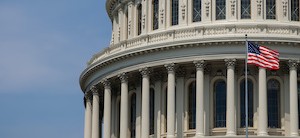Special Federal Legislative Committee Meeting: Earmarks
 Following the announcement from the House Committee on Appropriations that earmarks will return for the upcoming appropriations cycle, FY 2022, CASA’s Federal Legislative Committee (FLC) will hold a special meeting on the topic that will be open to the entire CASA membership.
Following the announcement from the House Committee on Appropriations that earmarks will return for the upcoming appropriations cycle, FY 2022, CASA’s Federal Legislative Committee (FLC) will hold a special meeting on the topic that will be open to the entire CASA membership.
On Wednesday, March 17, at 11:00am, CASA’s FLC will hold a special meeting to review the reinstallment of earmarks, now known as community funding projects, in Congress and discuss how CASA members can submit community funding project requests to their respective House and Senate Members for the upcoming Fiscal Year 2022 appropriations.
The meeting will be held over Zoom and open to all CASA members. A meeting invite will be sent out to the CASA membership ahead of March 17.
- $5 billion for ratepayer and utility assistance for water, wastewater, and electricity utilities
- As part of the $50 billion for Federal Emergency Management Agency’s disaster fund, $500 million for water assistance and $100 million for environmental justice grants
- Within the $350 billion for state and local governments assistance, there is language to allow water and sewer infrastructure eligibility for funding
New Ratepayer Assistance Push in Senate
 As the Senate considered the recently passed $1.9 trillion COVID-19 Relief Plan, the American Rescue Plan Act of 2021, Democrat Senators continued to push congressional leadership to include further ratepayer assistance measures in the package. One proposal to increase such assistance was a bill from Senator Jeff Merkley (D-OR), that would have created a new loan program, authorized at $9 billion through September 30, 2025, under the U.S. Environmental Protection Agency (USEPA) to assist water and wastewater and electric utilities with costs associated with uncollected bills in exchange for a moratorium on shutoffs. While this effort by Merkley ultimately failed, we can expect lawmakers to continue to call upon leaders to provide further assistance to address and support utilities, including wastewater utilities, and ratepayers struggling financially, as a result of the COVID-19 pandemic, is expected to continue. It is also possible for Merkley to continue to advocate for his proposal as Congress turns its attention to infrastructure investment.
As the Senate considered the recently passed $1.9 trillion COVID-19 Relief Plan, the American Rescue Plan Act of 2021, Democrat Senators continued to push congressional leadership to include further ratepayer assistance measures in the package. One proposal to increase such assistance was a bill from Senator Jeff Merkley (D-OR), that would have created a new loan program, authorized at $9 billion through September 30, 2025, under the U.S. Environmental Protection Agency (USEPA) to assist water and wastewater and electric utilities with costs associated with uncollected bills in exchange for a moratorium on shutoffs. While this effort by Merkley ultimately failed, we can expect lawmakers to continue to call upon leaders to provide further assistance to address and support utilities, including wastewater utilities, and ratepayers struggling financially, as a result of the COVID-19 pandemic, is expected to continue. It is also possible for Merkley to continue to advocate for his proposal as Congress turns its attention to infrastructure investment.
ASCE Publishes 2021 Infrastructure Report Card
![]() The American Society of Civil Engineers (ASCE) released their 2021 Infrastructure Report Card for America’s various infrastructure sectors and, overall, the grade of the nation’s infrastructure increased slightly to a C- from D+ in the 2017 Report Card. The Report Card graded the nation’s wastewater infrastructure at a D+, which translates to that the systems are poor and are at risk of failure. ASCE cites that the risk is due to the fact that the systems have reached the end of their service life. The Report Card states that the nation’s more than 16,000 wastewater treatment plants are operating at 81% design capacity, and while service demands have increased over the years, investment in the infrastructure has not. It estimates that the total funding gap for the sector will reach $434 billion by 2029, noting that the future funding needs will also involve addressing costlier operation and maintenance (O&M) needs. As a result of the growing O&M costs for utilities, the Report Card states that the nation will be faced with a single-year O&M shortfall of $18 billion in 2039.
The American Society of Civil Engineers (ASCE) released their 2021 Infrastructure Report Card for America’s various infrastructure sectors and, overall, the grade of the nation’s infrastructure increased slightly to a C- from D+ in the 2017 Report Card. The Report Card graded the nation’s wastewater infrastructure at a D+, which translates to that the systems are poor and are at risk of failure. ASCE cites that the risk is due to the fact that the systems have reached the end of their service life. The Report Card states that the nation’s more than 16,000 wastewater treatment plants are operating at 81% design capacity, and while service demands have increased over the years, investment in the infrastructure has not. It estimates that the total funding gap for the sector will reach $434 billion by 2029, noting that the future funding needs will also involve addressing costlier operation and maintenance (O&M) needs. As a result of the growing O&M costs for utilities, the Report Card states that the nation will be faced with a single-year O&M shortfall of $18 billion in 2039.
ASCE’s publication comes as Congress shifts its focus to infrastructure investment following passage of COVID-19 relief. The report card will serve as an important reference point as the next phase of President Biden’s legislative agenda moves into position for action later this spring, a vast economic-recovery package that will focus on addressing America’s infrastructure needs.
CASA Sends Support Letter to House Transportation and Infrastructure Subcommittee
On February 23, the House Committee on Transportation and Infrastructure Subcommittee on Water Resources and Environment held a hearing to examine the investment needs of the nation’s clean water infrastructure sector and review the Water Quality Protection and Job Creation Act of 2021 discussion draft. CASA sent a letter of support for the Water Quality Protection and Job Creation Act of 2021 discussion draft to the subcommittee to be included in the February 23rd hearing’s record.




 @CASA_CleanWater
@CASA_CleanWater